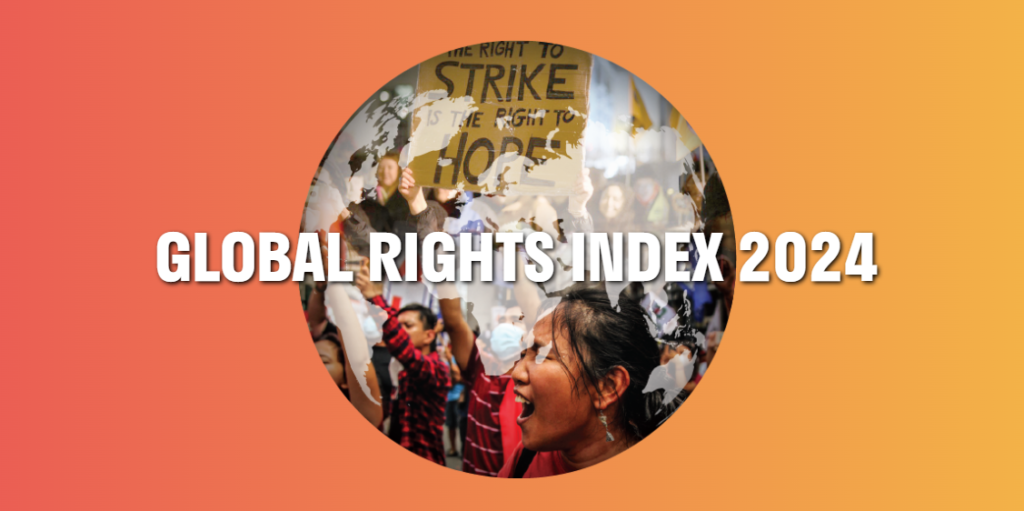The International Trade Union Confederation’s Global Rights Index 2024 provides a worrying insight into workers’ rights around the world. The report, now in its eleventh year, captures the growing efforts by governments and companies to restrict workers’ fundamental rights and freedoms. In almost nine out of ten countries, the right to strike has been violated and in about eight out of ten countries workers have been denied the right to collective bargaining. Alarmingly, 49% of countries unlawfully arrested or detained trade union members, up from 46% in 2023.
The report identifies the 10 worst countries for workers in 2024. These are Bangladesh, Belarus, Ecuador, Egypt, Eswatini, Guatemala, Myanmar, the Philippines, Tunisia and Turkey. From a regional perspective, countries in the Middle East and North Africa are the worst off with regard to workers’ rights, followed by Asia, the Pacific and Africa. The Americas, while scoring better on average, remained the deadliest region for workers and trade unionists, with 16 murders recorded between 2023 and 2024.

Europe
Europe, traditionally seen as a bastion of workers’ rights, has seen a worrying decline in recent years. The region’s average score on the Global Rights Index has deteriorated from 2.56 to 2.73 in the past year, continuing a long-term deterioration from 1.84 in 2014. This trend is indicative of the active erosion of Europe’s ‘worker-centred’ social model by governments and companies.
Several countries have contributed to this decline. France, for example, saw a significant crackdown on protests against pension reforms, with police violently cracking down on demonstrations. Belgium has also criminalised strikes, reflecting a wider trend of governments restricting the ability of workers to express their concerns collectively.
Even the Nordic countries, long admired for their strong social democracy, have not been immune to these changes. Finland’s rating has fallen from the top spot because of the right-wing coalition government’s reform proposals, which would seriously undermine workers’ and civil rights. In Sweden, a highly publicised dispute erupted when Tesla refused to enter into collective bargaining with the IF Metall Union, leading to strikes and union solidarity across Scandinavia.
The UK has also seen its fair share of labour conflicts when an overly broad definition of essential services has been used to restrict or ban strikes. This has affected a variety of sectors, from health to transport, and limited the ability of workers to bargain for better conditions.
In Eastern Europe, countries such as Hungary and Moldova are using similar tactics to limit strikes, especially in sectors considered key. In Poland, there have been cases of employer interference in union elections, while in North Macedonia there have been reports of the formation of “yellow unions” to undermine genuine employee representation.
On a more positive note, Romania has improved its ranking as the government has restored some basic, universal rights. The right to strike has been extended and collective bargaining is now compulsory in companies with more than 10 employees.
These developments across Europe highlight a worrying trend of weakening workers’ rights, even in regions historically known for strong labour law protections. This situation only underlines the need for continued vigilance and advocacy to preserve and improve workers’ rights across the continent.